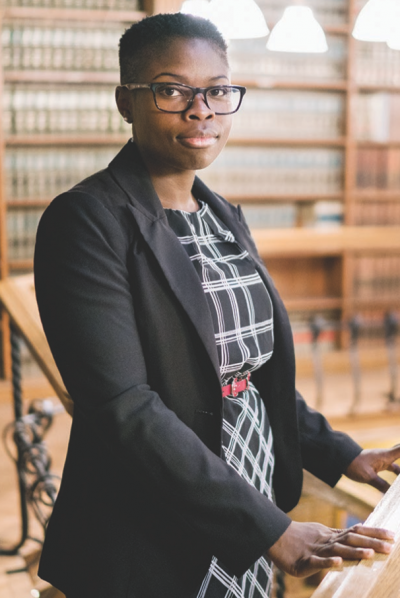Renatta Austin can’t afford an office. And she might not be able to any time soon. But that’s kind of the point. The 29-year-old lawyer is hell-bent on building a solo practice that serves those with the least money, so if she’s making enough to afford office rent, she’s charging too much. Especially when her current base of operations—the Great Library on the second floor of the Law Society of Upper Canada—is free.
“It’s nearly perfect,” says Austin, as she ushers me into one of the library’s meeting rooms. Clients can’t get in after 5 p.m., but otherwise, the space is great for meetings. “It’s private, and clients don’t care about having bells and whistles,” she tells me. And it keeps her prices ultra-low: Austin offers unbundled legal services and charges flat fees, based on hourly rates between $100 and $150. Yet the library is more than a cheap meeting spot. It comes with access to Wi-Fi, law journals and a first-rate librarian. “You can run an entire practice out of this place.”
And since last fall, that’s what Austin has done, on top of working from home. It started as a part-time gig. Austin saw clients in the evenings, and worked nine-to-five as policy counsel at the Association of Municipalities of Ontario. But after six months, she got antsy. Austin wanted to work for herself. By late summer, she quit her day job. “I’m relationship- and child-free,” says Austin. “There would never be a better time to make such a crazy decision.”

Every area of law has its own access-to-justice crisis. But Austin is tackling the one in administrative law—mostly education, a field entirely outside the remit of Legal Aid. She defends children who have been suspended or expelled (usually for fighting), and pressures schools to adequately accommodate students with special needs (by, say, providing them with an in-class assistant). Austin cut her teeth in the area shortly after law school as a volunteer at Pro Bono Law Ontario. Education files kept hitting her desk. “I absolutely loved it,” she says, smiling. “I’ve become passionate about helping young people.”
From the moment Austin started her firm, calls have flooded in from parents on almost every foothold of the economic ladder. Some make minimum wage; others earn $80,000 a year. None can find an affordable lawyer. “If you’re willing to work at a reduced rate,” says Austin, “you’ll have no problem getting clients.”
Austin hastens to add, however, that her firm couldn’t survive on those clients alone. Which is why, a few months into her practice, she cultivated a sideline in municipal law—in which she bills $300 to $400 an hour. Austin came by the idea while at the Association of Municipalities of Ontario. For example, when a bill comes up for a vote, city councillors need legal help to determine if they have a conflict of interest. Austin found this problem most acute in small towns, “where most elected officials are part-timers who have businesses in the community.” Now she advises councillors and mayors—she wouldn’t name any—from rural municipalities across the province. “That’s the trade-off,” she says, matter-of-factly. “To make ends meet, I do some work that might be less fulfilling.”
Austin also refuses to work for free. In the early days of her firm, she offered pro bono consultations, but it went terribly. “If people don’t have a stake in their case, if it hasn’t cost them something, they’re difficult to manage,” she says. “They wouldn’t show up to meetings, wouldn’t return phone calls, would sometimes just disappear.”
When public-interest lawyers are willing to work for free, that unrestrained altruism can seed their downfall. “I’ve see it happen,” says Lorne Sossin, dean of Osgoode Hall Law School, and an authority on access-to-justice. “When clients call in a crisis, lawyers often feel they can’t say no.” Austin, though, is prepared to do just that. “I love public-service work,” she says. “But I also have student loans to pay.”
Austin has put a lot on the line to start her firm. But why? Growing up in Roncesvalles Village, with her mother and father both working in public service, she never felt downtrodden or disadvantaged. So what drives her? “I’m sure my parents are also curious,” she answers when I ask her. Then she pauses, and struggles to find the right words. “Some people are just, sort of, meant to do public service. That’s part of me and I don’t know why.”
Whatever the reason, Austin is part of a pattern. “It’s always young lawyers who risk the most,” says Joanne St. Lewis, a bencher at the Law Society who has known Austin, through the Black Law Students Association, for a half-decade. “Renatta is re-thinking what it means to be a lawyer. And it’s gratifying to see: this is what re-invigorates us as a profession.”
Before our interview ends, Austin tries to answer my question again. “This is interesting work and I’m having fun. As long as that doesn’t change, I’ll keep doing it.”
Timeline of a young sole practitioner
2003: In high school, Austin begins a six-year volunteering stint at Hearing Every Youth Through Youth, which runs a teen helpline.
2005: Austin graduates from Bloor Collegiate, in downtown Toronto. “It was incredibly diverse. I met people from all walks of life.”
2009: With a degree in political science in hand from the University of Toronto, she enrolls in the faculty of law at the same school.
2012: Austin articles at the City of Toronto.
2013: To quench her thirst for more education, she enrolls in the Master’s of Public Administration a tWestern University.
2014: Austin makes two career moves. First, she takes a job at the Association of Municipalities of Ontario. At the same time, she starts her own law firm, dedicated to low-income clients.
2015, Spring: At 28 years old, Austin runs for bencher at the Law Society of Upper Canada. Her campaign is inspired. She doesn’t win a seat, but earns an astounding 2,329 votes. “I spent no money, I was a second-year call, and I did better than lawyers with the backing of Bay Street firms,” she says.“So I think I did really well.”
2015, Summer: Austin quits her day job to make her solo firm her only gig.
This story is from our Winter 2015 Issue.
Photography by Anya Chibis.


